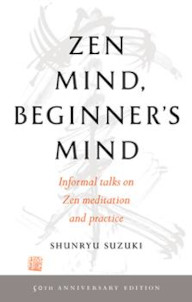- Zen Mind, Beginner’s Mind: Informal talks on Zen meditation and practice by Shunryu Suzuki.
- Read: January 1st, 2023 – January 15th, 2023.
- Rating: ⭐⭐⭐ (3/5)
Highlights
What teacher really offers the student is literally living proof that all this talk and the seemingly impossible goals can be realized in this lifetime. — p. 14
This is also the real secret of the arts: always be a beginner. — p. 16
Nothing outside yourself can cause any trouble. You yourself make the waves in your mind. If you leave your mind as it is, it will become calm. This mind is called big mind. — p. 26
With big mind we accept each of our experiences as if recognizing the face we see in a mirror as our own. For us there is no fear of losing this mind. There is nowhere to come or to go; there is no fear of death, no suffering from old age or sickness. Because we enjoy all aspects of life as an unfolding of big mind, we do not care for any excessive joy. So we have imperturbable composure, and it is with this imperturbable composure of big mind that we practice zazen. — p. 27
You should keep your mind on your breathing until you are not aware of your breathing. — p. 28
When you are determined to practice zazen with the great mind of Buddha, you will find the worst horse is the most valuable one. In your very imperfections you will find the basis for your firm, way-seeking mind. Those who can sit perfectly physically usually take more time to obtain the true way of Zen, the actual feeling of Zen, the marrow of Zen. But those who find great difficulties in practicing Zen will find more meaning in it. So I think that sometimes the best horse may be the worst horse, and the worst horse can be the best one. — p. 29
One who thinks he is one of the worst husbands may be a good one if he is always trying to be a good husband with a single-hearted effort. p. 30
Each bow expresses one of the four Buddhist vows. These vows are: “Although sentient beings are innumerable, we vow to save them. Although our evil desires are limitless, we vow to be rid of them. Although the teaching is limitless, we vow to learn it all. Although Buddhism is unattainable, we vow to attain it.” If it is unattainable, how can we attain it? But we should! That is Buddhism. — p. 36
Joshu, a great Chinese Zen master, said, “A clay Buddha cannot cross water; a bronze Buddha cannot get through a furnace; a wooden Buddha cannot get through fire.” Whatever it is, if your practice is directed toward some particular object, such as a clay, a bronze, or a wooden Buddha, it will not always work. — p. 57
When we become discouraged we want some medicine. When we are in good spirits we do not need any medicine. You should not mistake medicine for food. Sometimes medicine is necessary, but it should not become our food. — p. 61
Our understanding of Buddhism should not be just gathering many pieces of information, seeking to gain knowledge. Instead of gathering knowledge, you should clear your mind. If your mind is clear, true knowledge is already yours. — p. 66
Before we were born we had no feeling; we were one with the universe. This is called “mind-only,” or “essence of mind,” or “big mind.” After we are separated by birth from this oneness, as the water falling from the waterfall is separated by the wind and rocks, then we have feeling. You have difficulty because you have feeling. You attach to the feeling you have without knowing just how this kind of feeling is created. When you do not realize that you are one with the river, or one with the universe, you have fear. Whether it is separated into drops or not, water is water. Our life and death are the same thing. When we realize this fact we have no fear of death anymore, and we have no actual difficulty in our life. — p. 75
We should find the truth in this world, through our difficulties, through our suffering. This is the basic teaching of Buddhism. Pleasure is not different from difficulty. Good is not different from bad. Bad is good; good is bad. They are two sides of one coin. — p. 81
We will think, “Now it is raining, but we don’t know what will happen in the next moment. By the time we go out it may be a beautiful day, or a stormy day. Since we don’t know, let’s appreciate the sound of the rain now.” This kind of attitude is the right attitude. If you understand yourself as a temporal embodiment of the truth, you will have no difficulty whatsoever. You will appreciate your surroundings, and you will appreciate yourself as a wonderful part of Buddha’s great activity, even in the midst of difficulties. This is our way of life. — p. 95
Those who are attached only to the result of their effort will not have any chance to appreciate it, because the result will never come. — p. 101
Just to sit, without any idea of gain, and with the purest intention, to remain as quiet as our original nature—this is our practice. — p. 101
